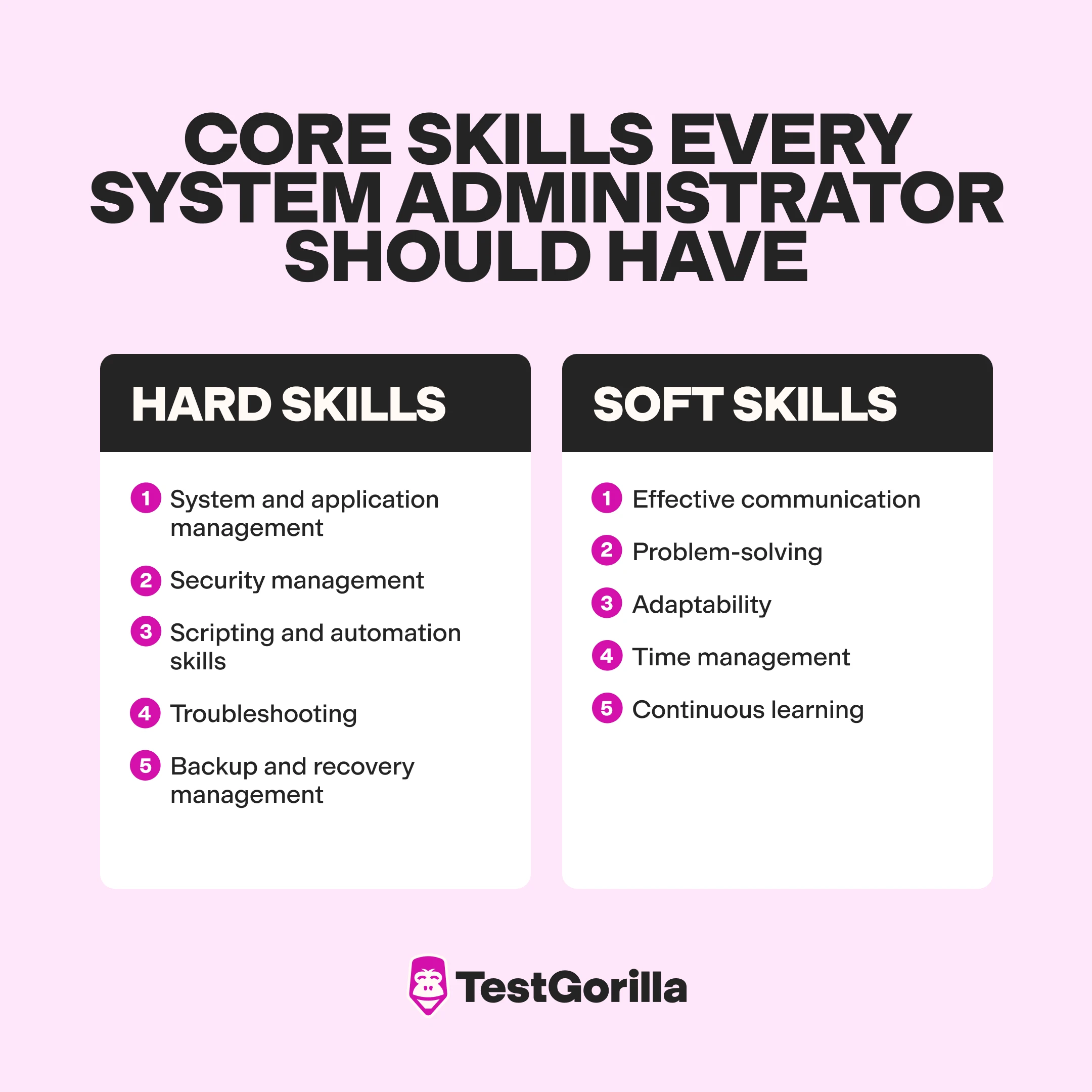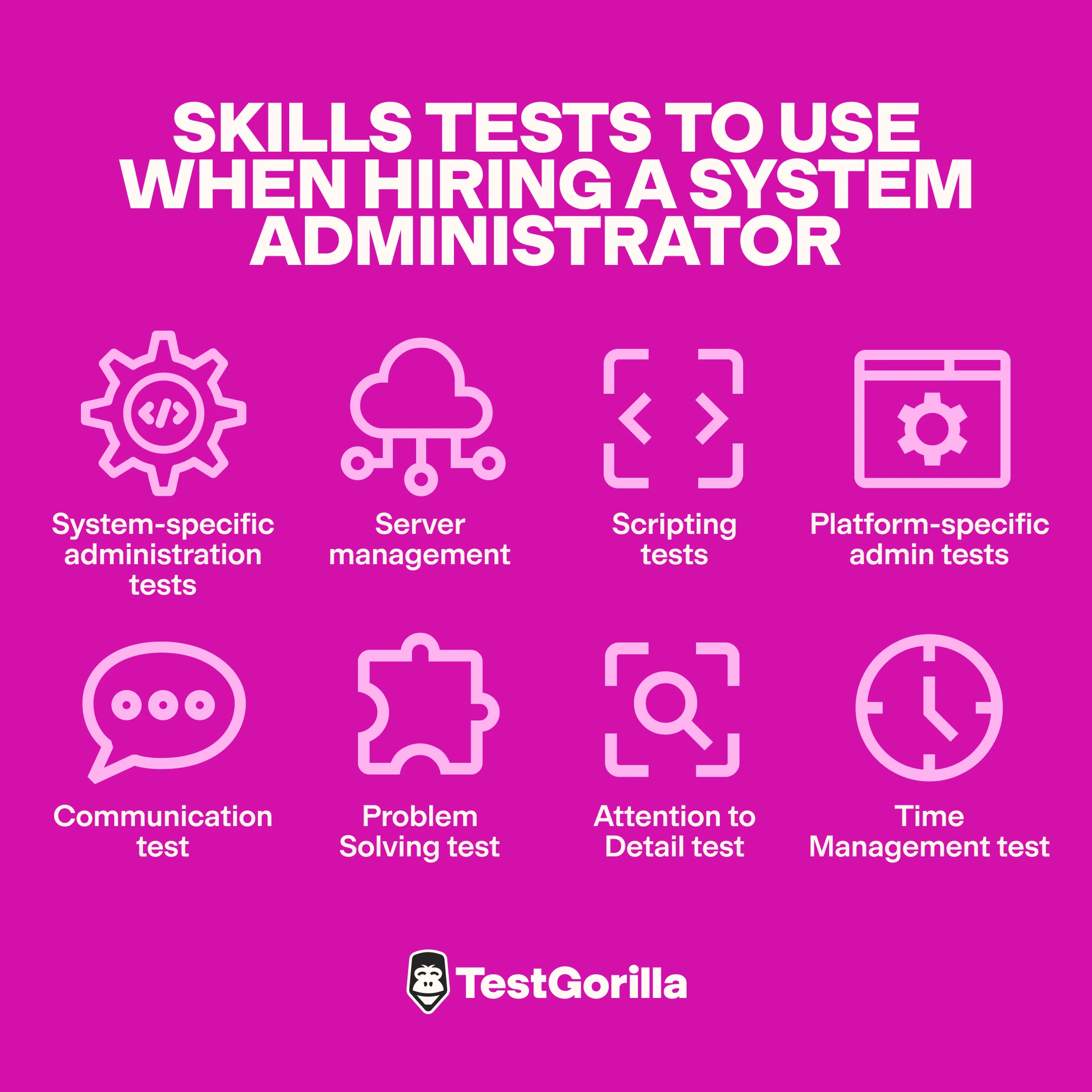Every company relies on a smoothly running IT infrastructure, and behind the scenes, system administrators make this happen. That’s why choosing the right person for this role is critical. But here's the catch: system admins need a wide range of skills.
If you're not sure which skills match a system admin’s job description, you might hire the wrong person. Then, you could end up with system downtime, frustrated users, and security weaknesses – a nightmare scenario for any business.
No worries, though! We’ve got your back. We walk you through what to look for in system administrator candidates so you can hire someone who’s got what it takes.
What is a system administrator?
System administrators – or “sysadmins,” as they call themselves – are the behind-the-curtains wizards making sure IT systems are secure and running in tip-top shape. They’re the ones setting up and maintaining computer systems, networks, and servers to perform the way organizations need.
On any given day, you’ll find them keeping an eye on your system’s performance, adding updates and patches, managing user accounts, and putting security measures in place to fend off cyber threats. They're also on standby to troubleshoot issues and minimize downtime.
But it’s a team effort. System administrators coordinate with different teams – the IT department for network management, the security team to enforce protocols, and end-users to resolve technical issues. They also work with vendors and service providers to ensure your hardware and software are up to date and functioning correctly.
Core skills every system administrator must have
Here are the hard and soft skills every system admin needs to excel.
Hard skills
These are the technical chops needed to keep everything IT-related in tip-top shape.
System and application management for keeping servers and software working well with tools like VMWare
Security management for putting security in place to protect systems against threats and patch up weak spots
Scripting and automation skills in languages like PowerShell, Bash, or Python to cut down on repetitive tasks and make things run faster
Troubleshooting skills for identifying and fixing technical issues quickly
Backup and recovery management for looking after backups and making sure you’ve got a solid plan in place for when things go sideways – so your data can stay available and whole
Soft skills
These are the personal skills that help sysadmins mesh with the team and stay on top of their game.
Effective communication for keeping things clear and simple, so everyone – even non-techies – gets it
Problem-solving for tackling tricky issues head-on and sorting them out with minimal fuss
Adaptability for rolling with the punches when new tech comes along or when the business shifts direction
Time management for keeping everything organized, juggling different tasks, and hitting deadlines
Continuous learning for always being on the lookout for new tech tricks – like artificial intelligence (AI) – and staying sharp to keep your systems at peak performance.
The best insights on HR and recruitment, delivered to your inbox.
Biweekly updates. No spam. Unsubscribe any time.
How to assess system administrator candidates
Your candidates might have these essential skills listed on their resumes – but how can you make sure they actually have the skills? The answer: You must assess them.
Fortunately, TestGorilla’s got your back. Our talent discovery platform makes this super easy. We offer 400+ tests, and you can combine two to five of these to create a custom talent assessment. Add your own questions to make your assessment even more customized!
Have your candidates take this assessment as the first step of the application process so you can spot the perfect person who can keep your computer systems running smoothly.
Not sure how to begin? Follow this approach.
Figure out if they’ve got the hard skills you need
You must make sure your system admin candidates have the practical skills needed to manage and secure your IT systems. You might use these tests:
System-specific administration tests: Our Microsoft Server Administration test, Windows Server administration test, Linux test, and Cloud Server Administration test check if they know how to handle system configurations, updates, and maintenance for specific systems.
Server management: Our VMWare test shows you if they know how to use this tool to make your server more efficient – and save money on hardware.
Scripting tests: The PowerShell test, Bash test, and Python (coding): Entry-Level Algorithms test shows you if they know the basic scripting and programming skills most sysadmins use.
Platform-specific admin tests: Our IT/Engineering Microsoft 365 test looks at their ability to administer Microsoft setups – including their troubleshooting skills.
Be sure to pick the tests that are relevant to your role, and make sure the tests you pick don’t test the same skill. For instance, there’s no need to use an Active Directory test if you’re already using the IT/Engineering Microsoft 365 test, as the IT/Engineering Microsoft 365 test already looks at your candidates’ Active Directory know-how.
Make sure their soft skills are on par for the role
Soft skills are just as important as hard skills for system administrators. Consider using these TestGorilla tests to assess your candidates:
Communication test: This one shows you their active listening skills, plus their verbal and non-verbal communication skills. This way, you can see how they’ll communicate in your professional spaces.
Problem Solving test: This one shows you how they reason through hiccups and solve them. IT problems come up almost daily, and they’ll need to provide solutions – sometimes on the fly.
Attention to Detail test: This one lets you see how they process information while paying attention to text. This is a skill they’ll need in various situations – for example, for spotting phishing emails by seeing a missing character in an email address.
Time Management test: This one shows you how they juggle tasks to meet deadlines. Sysadmins will constantly have multiple projects to handle at once.
Pssst! Check out the rest of our tests for system administrators to find any others you need. You might find even more tests by searching through our library. For instance, our DevOps test might be great for sysadmins in environments where DevOps methods are key.
See how they’ll impact your company culture
Sysadmins must work with every team in your organization who uses your tech system. So, they need to bring more to the team than just their admin skills. They must also add to your culture with new approaches and fresh perspectives.
Using a Culture Add test in your hiring process helps you understand your system admin candidates’ values and behaviors and how they stack up against yours and your company’s – so you can make sure they’ll be a great addition to your team.
Go deeper with interviews
Interviewing candidates can help you learn everything you didn’t learn from their assessments.
For example, to assess their continuous learning skills, you could ask:
Can you share a time when you had to quickly learn a new technology or tool to solve a problem? How did you approach the learning process, and what was the result?
This question lets you see how candidates handle learning new tech and applying them when solving problems.
Another key question could be:
Can you describe an instance where you had to adapt to a significant change in your IT environment? What strategies did you use to manage the transition, and what was the outcome?
This helps you understand their ability to adapt to changes.
Need more question ideas? Our article on 50+ interview questions for administrators can help – just customize them to your needs!
If your sysadmin will work with Linux, you might also check out our Linux admin interview questions.
2 mistakes to avoid when assessing system administrator candidates
Avoiding these two common mistakes during assessments can save your business a lot of trouble and headaches when hiring a system administrator.
1. Ignoring hands-on experience with specific systems
Knowing general IT concepts is great, but you need candidates who have real-world experience with the specific systems your organization uses – like Windows Server, Linux, or specific cloud services.
If your candidates don’t know how to use your systems beforehand, they’ll have to play catch-up with your team. A learning curve that steep could slow down your system’s operations.
Be sure to assess their experience – or their willingness and ability to learn.
2. Not checking their backup and recovery expertise
Don’t overlook candidates' skills in backup and recovery. You need to know their approach to data integrity and disaster recovery.
Not checking for this skill could land you a system admin who can’t recover important data if it's lost.
Be sure to probe their experience, ask detailed questions about their methods, or give them scenarios that force them to think on their feet about disaster recovery.
FAQs
Still curious about sysadmins? Here are some answers to frequently asked questions.
What is an example of a system administrator?
A system administrator (sysadmin) manages and maintains an organization's IT infrastructure. Examples include:
Corporate IT sysadmin: Manages company servers and user accounts
Web server admin: Handles web server configurations and security
Database admin: Maintains database systems and ensures data integrity.
Does a system administrator require coding?
Not really. Most of the job is about setting up and maintaining systems, managing user accounts, and fixing issues. They don’t need to know any code. But knowing some scripting (like PowerShell or Bash) can be really handy for automating tasks and solving tricky problems more easily.
Ish Sookun, a Systems Architect at La Sentinelle who’s considered a “top system administration voice” on LinkedIn, wrote:
System Administrators with software development skills can very easily adapt to changing/evolving environments. Scripting is often underrated or limited to simple tasks but mastering the skill and writing scripts for more complex tasks enhances a SysAdmin's abilities.
Find the best system administrator with TestGorilla
Finding the right system administrator is a must for keeping your IT infrastructure running smoothly. They need a mix of skills – from system configuration to continuous learning.
TestGorilla offers a range of tests to help you check for these essential skills, making it easier to find the perfect sysadmin for your team.
Improve your hiring process with TestGorilla. Explore our test library, book a demo, or sign up for a free account to get started today.
You've scrolled this far
Why not try TestGorilla for free, and see what happens when you put skills first.
















